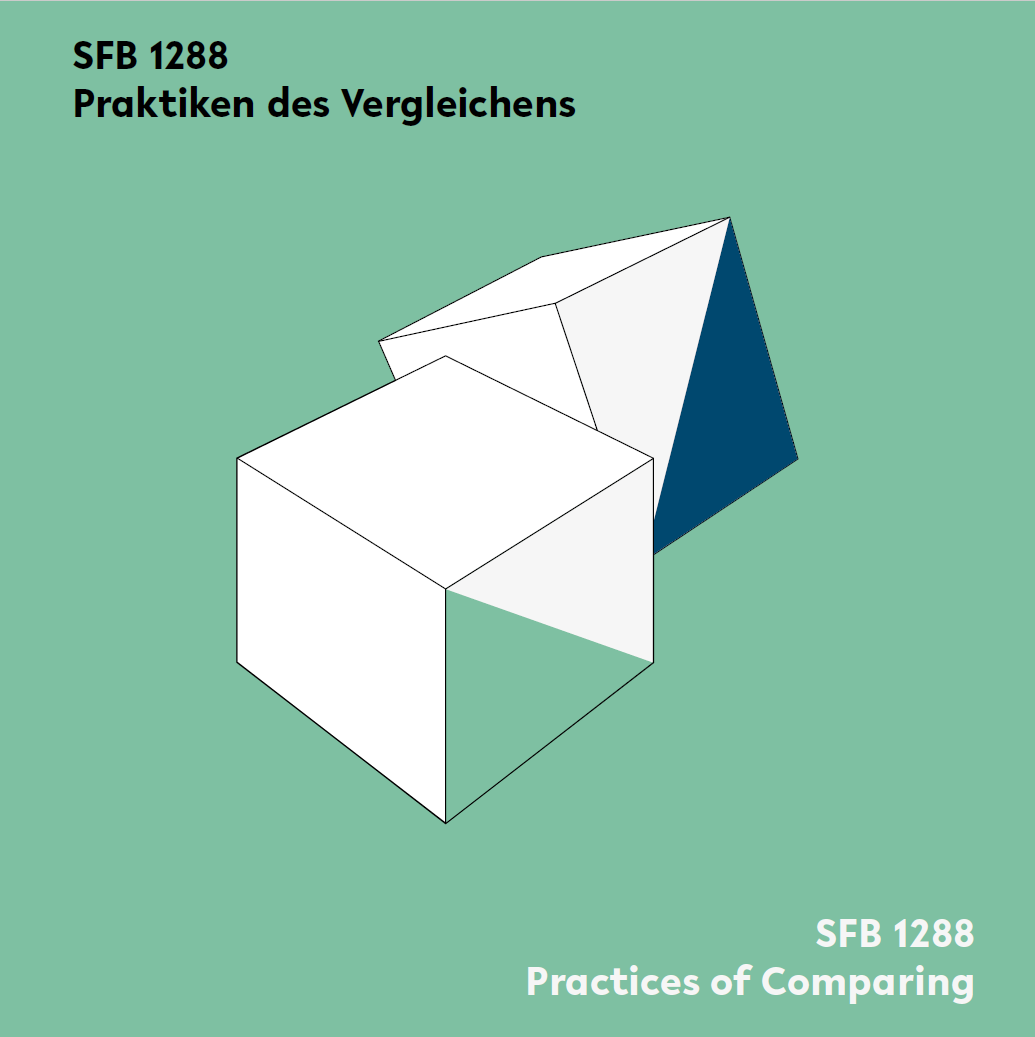Profil
SFB 1288

Ziele
Ziel der zweiten Förderphase ist die Erforschung der Vergleichspraktiken auf der Mesoebene. Dabei wird ein besonderer Augenmerkt auf die produktive Kraft der Vergleichspraktiken und die Modi des Vergleichens zu richten sein, um das Wechselspiel von Stabilisierung und Wandel mittlerer Reichweite herauszuarbeiten. Die Begriffe Praxisformation, communities of practice sowie die daraus abgeleiteten Begriffe Vergleichsformation oder Vergleichsdispositiv dienen uns dabei als Heuristik, um Vergleichspraktiken auf der Mesoebene untersuchen zu können. Während damit einerseits die Wechselwirkung zwischen der in der ersten Förderphase erarbeiteten Mikroebene mit der Mesoebene einbezogen wird, werden in einzelnen Projekten bereits die Wirkungen auf die Makroebene in den Blick kommen. Damit sollen wichtige Bausteine für eine kontingenzsensible Theorie historischen Wandels herausgearbeitet werden, einem der Ziele für den gesamten Förderzeitraum von zwölf Jahren.
Spannungsfelder
Das Zusammenspiel von Vergleichspraktiken auf den verschiedenen Ebenen muss die Herausforderung meistern, die Vielzahl identifizierbarer Vergleichspraktiken zu unterschiedlichen Dynamiken mittlerer Reichweite – mit je eigenen Eigenschaften, Geschwindigkeiten, Temporalitäten / Zeitlichkeiten und Wandlungstendenzen – in (Wechsel-)Beziehung zu setzen. Dabei müssen Störungen, Zufälle, die Unvorhersehbarkeit von Entwicklungen, deren Vielfalt und Widersprüchlichkeit zu übergehen. Dafür ist es unabdingbar, Einsichten in Dynamiken mittlerer Reichweite an die Analysen von Mikrodynamiken, von situativen Aushandlungsprozessen, von spezifischen sozialen Kontexten, die von Konflikten und Widersprüchen geprägt sind, zurückzubinden. Zugleich muss danach gefragt werden, ob es umfassendere Anpassungs- und Angleichungsdynamiken, Abgrenzungs- und Differenzierungsprozesse gab, die es sinnvoll erscheinen lassen, von historischen Transformationen auf der Makroebene zu sprechen, wie etwa die Entstehung eines global homogenisierten Verständnisses von Religion oder Weltliteratur, globaler wissenschaftlicher Disziplinen und Sportarten, global operierender Märkte, eines nach nationalen Kollektividentitäten geordneten und entsprechend differenzierten Staatensystems.
Gleichstellung
Die Universität Bielefeld fördert seit langem erfolgreich die Herstellung von Chancengerechtigkeit auf allen Ebenen und in allen Bereichen mit strukturellen, konzeptionellen und forschungsbezogenen Maßnahmen. Der aktuelle Rahmenplan zur Gleichstellung von Männern und Frauen sieht ausdrücklich die Schaffung gleicher Entwicklungsmöglichkeiten für Frauen als Aufgabe aller Mitglieder und Angehörigen der Universität vor und macht Gleichstellung so zum zentralen Anliegen der gesamten Universität, ihrer Leitung und aller Personalverantwortlichen. Die Gleichstellung von Wissenschaftler*innen sowie die Vereinbarkeit von Familie und Karriere sind daher auch wichtige Ziele des SFB, um Frauen möglichst früh darin zu unterstützen, eine wissenschaftliche Karriere einzuschlagen: Wir schreiben Stipendien für MA-Studentinnen aus, die an der Universität Bielefeld eine Abschlussarbeit im Bereich der Vergleichspraktiken bearbeiten und unterstützen Wissenschaftlerinnen in der Übergangsphase nach der Promotion. Dabei werden die Wissenschaftlerinnen insbesondere bei der Erhöhung ihrer internationalen Sichtbarkeit unterstützt und zur Teilnahme an Konferenzen und zu Forschungsaufenthalten im Ausland angeregt. Zudem werden beständig Maßnahmen zur weiteren wissenschaftlichen Vernetzung und zur Publikationstätigkeit entwickelt. Der SFB unterstützt Wissenschaftlerinnen indem für Konferenzteilnahmen und Auslandsaufenthalte Gelder für Betreuungskosten zur Verfügung gestellt werden. Die Förderung der Diversität, die das Gleichstellungsprogramm flankiert, wird uns in den kommenden Jahren verstärkt begleiten, denn nicht nur geschlechtsspezifische Benachteiligungen sollen reflektiert und abgebaut werden, sondern auch solche aufgrund sozialer, kultureller und religiöser Herkunft oder körperlicher Beeinträchtigungen.
Förderung der Doktorand*innen und Postdoktorand*innen
Ein wichtiger Teil der Forschungsarbeit im SFB 1288 wird durch Doktorand*innen und Postdoktorand*innen geleistet. Zentrales Anliegen unseres Forschungsverbundes ist daher die optimale Unterstützung der wissenschaftlichen Qualifikation dieser beiden Gruppen. Für wissenschaftliche Mitarbeitende der ersten Qualifikationsphase (Doktorand*innen) sind die Bielefeld Graduate School in History and Sociology (BGHS), die Schreib- und Publikationsförderung sowie eigene Beratungsstellen im SFB 1288 zentrale Fördermaßnahmen. Für wissenschaftliche Mitarbeitende der zweiten Qualifikationsphase (Postdoktorand*innen) gibt es auf deren Bedürfnisse zugeschnittene Fortbildungsformate sowie das Zentrum für interdisziplinäre Forschung (ZiF), das mit dem Programm „Das junge ZiF“ unter anderem Möglichkeiten der Netzwerkbildung und der Weiterentwicklung wissenschaftlicher Projekte bietet. Bei Einstellungen im SFB 1288 ist Diversität im Hinblick auf die internationale Zusammensetzung, die sozialen und kulturellen Hintergründe sowie das Geschlecht unser oberstes Ziel. Wir erhoffen uns von einer großen Diversität der SFB 1288-Mitglieder möglichst heterogene Forschungsperspektiven, die miteinander in einen Dialog treten können. Basierend auf dem Konzept des kollegialen Lernens arbeiten Promovierende gemeinsam an methodischen und theoretischen Fragestellungen zu ihren Forschungsprojekten, wodurch die interdisziplinäre Zusammenarbeit im SFB 1288 gestärkt wird.

